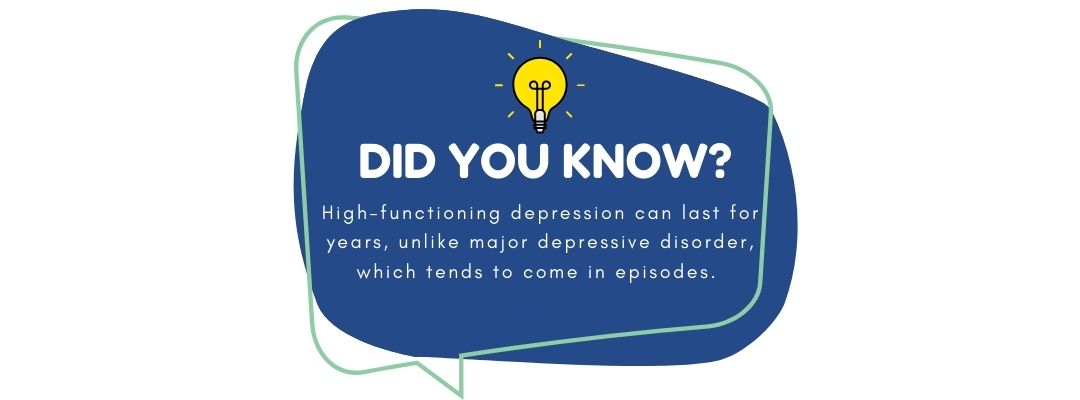High Functioning Depression: Understanding Its Impact on Daily Life
High-functioning depression is a silent struggle that many face while appearing to maintain a normal life. It refers to individuals who experience symptoms of depression yet continue to fulfill daily responsibilities and obligations. Often mistaken as simply being tired or stressed, this condition can easily go unnoticed by friends, family, and even the person experiencing it.
Those with high-functioning depression may excel at work or school but find it increasingly challenging to cope with their feelings. This results in a paradox where they manage to uphold a façade of normalcy while battling inner turmoil. Recognizing the signs is essential, as it can lead to better understanding and support for those affected.
Navigating high-functioning depression requires awareness and effective coping strategies. With the right treatment and support, individuals can work toward managing their symptoms and improving their quality of life.
Key Takeaways
- High-functioning depression allows individuals to appear “normal” while struggling internally.
- Recognizing symptoms is crucial for seeking support and treatment.
- Effective coping strategies and resources can improve daily life for those affected.
Understanding High Functioning Depression
High functioning depression is a complex mental health condition. It can make daily life challenging, even when a person seems fine on the outside. Understanding its definition, symptoms, and diagnostic criteria is essential for better awareness and support.
Definition and Overview
High functioning depression, also known as persistent depressive disorder (PDD) or dysthymia, is a term that describes a form of depression. Individuals with this condition often manage to fulfill their daily responsibilities while struggling internally.
This type of depression may not be as visible as major depressive disorders, making it harder to recognize. Symptoms can last for a long time, often years, leading to a chronic feeling of sadness or low energy.
People with high functioning depression may appear successful in careers and personal lives. Yet, they often experience significant internal distress, which can lead to burnout or decrease in overall happiness.
Symptoms and Diagnostic Criteria
The symptoms of high functioning depression can be subtle but significantly impact a person’s life. Common symptoms include:
- Persistent sadness
- Low energy or fatigue
- Feelings of hopelessness
- Difficulty concentrating
While individuals may seem fine to others, they might struggle with their emotions daily. To be diagnosed with high functioning depression, a person must experience these symptoms for at least two years.
The symptoms can overlap with other mood disorders. Therefore, it is crucial for professionals to conduct thorough evaluations. This includes understanding the individual’s emotional state and how it affects their daily activities. Recognizing these signs early can lead to effective management and support.
The Impact on Daily Life
High-functioning depression can significantly affect various aspects of daily life. Individuals may appear to manage their responsibilities well, but underlying struggles can disrupt personal relationships, workplace performance, and self-care routines.
Personal Relationships
People with high-functioning depression often face challenges in personal relationships. They might feel disconnected from friends and family, even while maintaining daily interactions.
Feelings of sadness and anxiety can make it hard to engage authentically. They may put on a brave face, masking their true emotions. This can lead to misunderstandings and feelings of isolation.
Additionally, the pressure to uphold appearances can create stress, making it harder for individuals to open up about their struggles. This lack of communication can strain bonds and lead to frustration for both parties.
Workplace Performance
In the workplace, high-functioning depression can affect productivity and job satisfaction. Individuals may successfully complete tasks but might struggle with motivation and focus.
They often experience fatigue, which can lead to decreased efficiency over time. The need to appear competent can create a constant state of pressure, which contributes to anxiety.
Moreover, they may avoid seeking help or taking breaks, fearing judgment from colleagues. This can result in burnout and a hostile work environment, impacting overall performance.
Self-Care and Lifestyle
Maintaining self-care practices becomes challenging for individuals dealing with high-functioning depression. They might neglect physical health, such as diet and exercise, due to lack of motivation.
Sleep disturbances are also common, leading to decreased energy levels. Imitating normal routines can be exhausting, leaving little room for personal time or relaxation.
This neglect can reinforce negative feelings, creating a cycle that affects overall well-being. Acknowledging the need for self-care is critical for improvement, but individuals often struggle to take that first step.
Treatment Strategies
Effective treatment strategies for high-functioning depression include psychotherapy, medication, and holistic options. Each approach plays a crucial role in managing symptoms and improving overall well-being.
Psychotherapy Approaches
Psychotherapy is a key part of treating high-functioning depression. Cognitive Behavioral Therapy (CBT) is often used. It helps individuals recognize and change negative thought patterns. This approach can lead to significant improvements in mood and coping skills.
Another effective method is Acceptance and Commitment Therapy (ACT). This technique encourages individuals to accept their feelings while committing to personal values and actions that align with those values.
Engaging in regular therapy sessions provides support and accountability. It is common for therapists to incorporate mindfulness techniques to enhance emotional regulation and resilience.
Some people may also suffer from an additional co-occurring disorder. In this case, many of the same psychotherapy approaches are appropriate.
Medication and Pharmacotherapy
Medication may be necessary for some individuals. Antidepressants, particularly Selective Serotonin Reuptake Inhibitors (SSRIs), are commonly prescribed. They help balance brain chemicals that affect mood.
It’s crucial for individuals to work closely with their healthcare providers to find the right medication. This process can involve trying different medications and dosages.
Regular follow-ups allow for monitoring side effects and effectiveness. Adhering to the prescribed treatment is vital, as stopping suddenly can lead to worsened symptoms.
Holistic and Alternative Treatments
Holistic treatments focus on the whole person. Mindfulness and meditation can significantly reduce stress and improve emotional health. These practices encourage individuals to live in the moment and foster self-acceptance.
Physical activity is also beneficial. Regular exercises, like walking or yoga, release endorphins. This natural mood booster can help combat feelings of sadness.
Nutritional changes may provide additional support. A balanced diet rich in omega-3 fatty acids, vitamins, and minerals can enhance mental well-being. Seeking guidance from a nutritionist can help create a personalized eating plan tailored to individual needs.
Support and Resources
Finding support and resources is crucial for individuals dealing with high-functioning depression. They can benefit significantly from both community support and professional help. These connections can provide necessary guidance and relief.
Support Networks and Community
Building a support network is vital for anyone facing high-functioning depression. Friends and family can offer emotional backing. It is important for individuals to reach out and communicate their feelings.
Support groups, either in-person or online, can provide shared experiences and advice. These groups foster a sense of belonging and reduce feelings of isolation. Many find comfort in hearing others’ stories and knowing they are not alone.
Community resources, such as local mental health organizations, can also be beneficial. These services often host workshops and events that promote mental wellness. They can help individuals connect with others who understand their struggles.
Accessing Professional Help
Professional help is essential for managing high-functioning depression effectively. A mental health professional can provide tailored treatment options. This can include therapy, medication, or a combination of both.
Individuals should consider seeking help from psychologists or psychiatrists who specialize in depression. They can offer valuable insights and coping strategies. It is important to find a provider who is a good fit, making the experience more comfortable.
Telehealth is another option, allowing people to connect with professionals remotely. This can be especially beneficial for those who live in remote areas or have mobility issues. Many online platforms provide access to qualified therapists, making it easier to receive help when needed.
Conclusion: High Functioning Depression
In conclusion, high-functioning depression can be a silent, yet impactful, struggle for many individuals. Despite outward appearances of normalcy and success, the internal battle with persistent sadness, fatigue, and hopelessness can be overwhelming. Recognizing the signs and understanding its complexities is crucial for providing the necessary support and care. With appropriate treatment strategies—including therapy, medication, and holistic practices—individuals can manage their symptoms and improve their overall quality of life. It is important to remember that even those who seem to function well may be facing significant emotional challenges. Encouraging open communication, fostering supportive relationships, and seeking professional help are key steps in addressing high-functioning depression and promoting mental health awareness.
You’re not alone, and help is always within reach. Contact us today at (774) 619-7750 and take control over your mental health.





